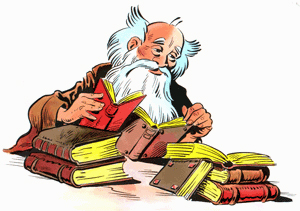Bibliography of sources of information and articles about a variety of technological and scientific advances from the past to the present.
(A bibliography of tech and science sources of information from the past and the present)
Doing research is very much like going to cemeteries (libraries) and opening the appropriate graves (books) found there and re-arranging the bones (words); a concept that can be verified by the following extensive list of graves that have been and are being picked through for suitable bone arrangements.

Sources of Information about Technological and Scientific Advances from the Past and the Present
Lists of books, dictionaries, etc. which function to present data about science, technology, inventions, medicine, and other events that have had an affect on mankind.

There is more treasure in books than in all the pirates' loot on Treasure Island, and best of all, you can enjoy these riches every day of your life.
Academic Press Dictionary of Science and Technology. New York: Harcourt Brace Jovanovich, Publishers, 1992.
Asimov, Isaac. Asimov's Chronology of Science & Discovery. New York: Harper & Row, Publishers, 1989.
Barnhart, Robert K., ed. The American Heritage Dictionary of Science. Boston: Houghton Mifflin Company, 1986.
Boorstin, Daniel J. The Creators, A History of Heroes of the Imagination. New York: Vintage Books, A Division of Random House, Inc., 1993.
Boorstin, Daniel J. The Discoverers, A History of Man's Search to Know His World and Himself. New York: Random House, 1983.
Brown, Roland Wilbur. Composition of Scientific Words. Washington, D.C.: Smithsonian Institution Press, 1985.
Gayley, Charles Mills. The Classic Myths in English Literature and in Art. Boston: Ginn and Company, 1939.
Hayes, Bill. Five Quarts, a Personal and Natural History of Blood. New York: Ballantine Books, 2005.
International Dictionary of Medicine and Biology. Volumes I-III. New York: John Wiley and Sons, Inc., 1986.
Jackson, Joe. A World on Fire; A Heretic, an Aristocrat, and the Race to Discover Oxygen. New York: Vliking, 2005.
Klein, Dr. Ernest. A Comprehensive Etymological Dictionary of the English Language, Volumes I and II. New York: Elsevier Publishing Company, 1966.
Kravitz, David. Who’s Who in Greek and Roman Mythology. New York: Clarkson N. Potter, Inc./Publisher, 1975.
Lincoln, R.J. and G.A. Boxshall. The Cambridge Illustrated Dictionary of Natural History. Cambridge, Great Britain: Cambridge University Press, 1987.
McAdam, E.L., Jr. & George Milne. Johnson’s Dictionary, A Modern Selection. New York: Pantheon Books, 1963.
McGraw-Hill Dictionary of Scientific and Technical Terms, 4th Ed. New York: McGraw-Hill Book Company, 1989.
Sabin, Frances E. Classical Myths That Live Today. Morristown, New Jersey: Silver Burdett Company, 1958.
Schmidt, Jacob Edward. Reversicon, A Medical Word Finder. Springfield, Ilinois: Charles C. Thomas, 1958.
Tripp, Edward. Crowell’s Handbook of Classical Mythology. New York: Thomas Y. Crowell Company, 1970.
Van Aken, A.R.A. The Encyclopedia of Classical Mythology. Englewood Cliffs, New Jersey: Prentice-Hall, Inc, 1963.
Von Hagen, Victor W. The Roads That Led to Rome. Cleveland, Ohio: The World Publishing Company, 1967.
Webster’s, New International Dictionary of the English Language, 2nd Ed. Unabridged. Springfield, Massachusetts: G. and C. Merriam Company, Publishers, 1952.
Webster’s, New World Dictionary of the American Language, 2nd College Ed. Cleveland, Ohio: William Collins/World Publishing Co., Inc., 1974.
Lists of sources of information from magazines, newspapers, radio, TV, etc.
Gamkrelidze, Thomas V. and V.V. Ivanov. “The Early History of Indo-European Languages.” Scientific American. March 1990, pp. 110-116.
Renfrew, Colin. “The Origins of Indo-European Languages.” Scientific American. October 1989, pp. 106-114.
Every man who knows how to read has it in his power to magnify himself, to multiply the ways in which he exists, to make his life full, significant and interesting.